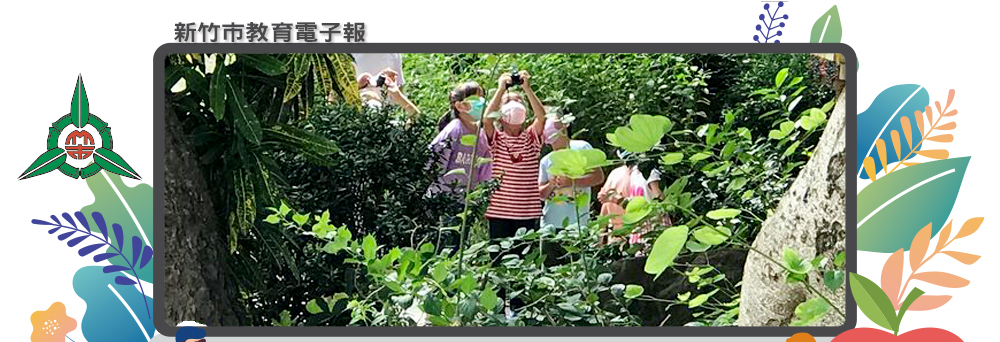文/徐玉芬 新竹國小附設幼兒園主任
《摘要》
幼兒園的美好時光,是藉由探索、覺察、開啟各種感官的觸角,體驗學習生活裡所發生的事件,感受生活時光中的日常幸福,並從中養成幼兒的能力。
常有家長或朋友問我,幼兒園到底學什麼 ? 我比較喜歡以幼教的語言來解釋 「玩什麼?」、「體驗什麼?」。在幼兒園裡學生活的一切,以「玩」為核心,學習生活裡的規律、生活裡的秩序、生活裡的技巧、 生活裡的知識 ,從幼兒的視角發現生活周遭的事物,再帶領幼兒們一起體驗並探索經歷的過程。
當孩子們踏入校園起,老師們就賦予他們探索學習的魔法,在每日作息不同任務中,反覆練習自理的能力, 從每天經驗累積一小步開始前進 ,培養著看似無形卻是孩子們真實能帶走的能力。
猶記著~先能自理才能自立
生氣蓬勃的教室內,以主題或學習區活動,教師們有規劃的提供不同層次的挑戰任務,讓不同年齡與能力的幼兒都能找到自己感興趣的項目投入。從體驗「玩」的樂趣,到從失敗中思考解決問題;在衝突中學會人際互動與合作。
在戶外活動中,我們奔跑在草地上,享受風從我們臉龐掠過,觀察發現校園動植物的生長,感受四季的變化、大自然帶來的禮物、發現光影投射在古蹟建築之美。每天忙碌充實的感受並體驗生活,在玩中一點一滴的建立規範、技巧、自信、感受力,讓這些慢慢變成孩子們的能力。
你覺得我們在學什麼呢?
行文走筆至此,有一篇短文一直在我的腦海中盤旋,在此時正適合與大家分享:
All I really need to know I learned in kindergarten
『所有一切真正應該學的事,我早在幼兒園就已經學過了!』
Most of what I really need to know about how to live and what to do and how to be I learned in kindergarten.
大部分我需要知道的—人該怎麼活?該做些什麼?怎麼做?我都在幼兒園學過了。
Wisdom was not at the top of the graduate-school mountain, but there in the sand pile in kindergarten.
智慧並非來自巍巍的學術殿堂,而是來自幼兒園的沙坑中。
These are the things I learned:
以下這些就是我在那裡學到的事情:
Share everything.
分享所有的事物
Play fair.
遊戲時講求公平
Don't hit people.
不能打人
Put things back where you found them.
物歸原位
Clean up your own mess.
自己弄亂的東西自己清理
Don't take things that aren't yours.
不要拿不屬於你的東西
Say you're sorry when you hurt somebody.
傷害了別人要說對不起
Wash your hands before you eat.
吃東西前要洗手
Flush.
上完廁所要沖馬桶
Warm cookies and cold milk are good for you.
熱烘烘的餅乾和冰牛奶對身體有益
Live a balanced life - learn some and think some and draw, paint, sing, dance, play and work every day some.
生活要平衡、每天都要學點東西、想些事情、畫些圖、唱些歌、跳些舞、做點工作、玩點遊戲。
Take a nap every afternoon.
每天下午小睡片刻
When you go out into the world, watch out for traffic, hold hands, and stick together.
當你走到外面這個世界時,要注意交通安全,大家手牽手一起走
Be aware of wonder.
察覺生活中驚奇的事
Remember the little seed in the Styrofoam cup: the roots go down and the plant goes up and nobody really knows how or why, but we are all like that.
記得在塑膠杯子裡的小種籽嗎?根往下長,葉子往上冒,沒有人知道為什麼,但是我們卻也都這樣長大。
Goldfish and hamsters and white mice and even the little seed in the Styrofoam cup - they all die. So do we.
金魚、天竺鼠和小白鼠,甚至是那粒在塑膠杯子裡小種籽,最後它們都會死去 --- 而我們也是一樣!
And then remember the Dick-and-Jane books and the first word you learned - the biggest word of all - LOOK.
記住學識字的圖畫書裡,那個第一個學會、也是最大的字:「仔細看Look」。
Everything you need to know is in there somewhere. The Golden Rule and love and basic sanitation. Ecology and politics and equality and sane living.
所有你該知道的都可在這裡找到,處世的金科玉律、愛、衛生常識、生態學、政治學,還有健康的生活。
Take any one of those items and extrapolate it into sophisticated adult terms and apply it to your family life or your work or government or your world and it holds true and clear and firm.
你可以挑出任何一項,然後用複雜成人語彙擴充解釋、運用在你的家庭生活、你的工作、你的政府或全世界,它們依然是清楚不變的道理。
Think what a better world it would be if we all - the whole world - had cookies and milk at about 3 o'clock in the afternoon and then lay down with our blanket for a nap.
舉例而言,想像一個美麗新世界 --- 如果全世界在下午三點都停下來吃些餅乾和喝牛奶,然後躺下來小睡片刻。
Or if all governments had as a basic policy to always put things back where they found them and to clean up their own mess.
或是全世界所有政府都能建立一個簡單政策 --- 物歸原位和清理自己製造的垃圾。
And it is still true; no matter how old you are, when you go out in the world, it is best to hold hands and stick together.
還有一件事永遠是對的,不論你多老了,外出時最好還是跟人手牽手,一起走
(原文刊載於1986年9月17日堪薩斯市時報,作者為美國華盛頓一教會名譽牧師Robert Fulghum,Kansas City Times;譯文刊載於成長幼教季刊39期34頁)
 |
 |
圖一 探索校園之美 |
圖二 感受季節光影變化 |
 |
圖三 戶外大肌肉運動 |
|







